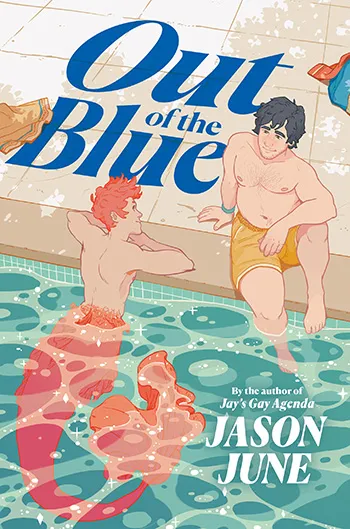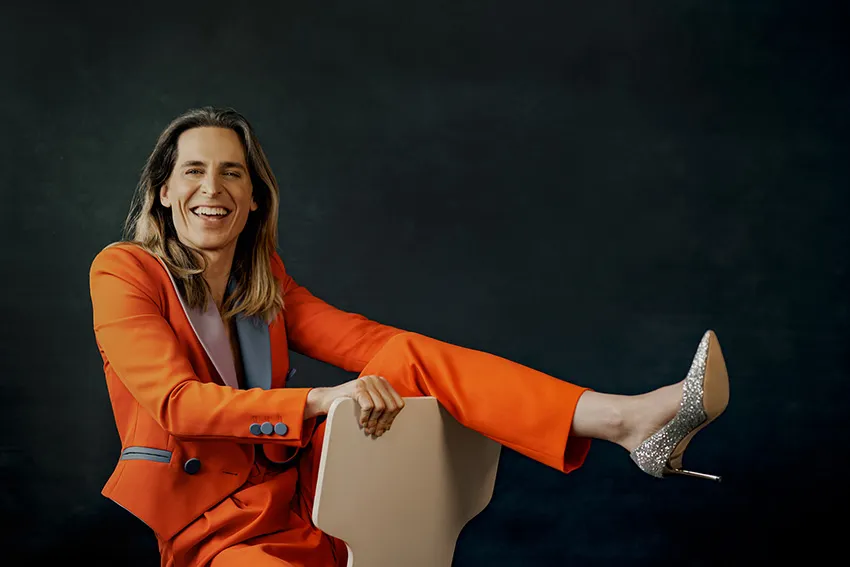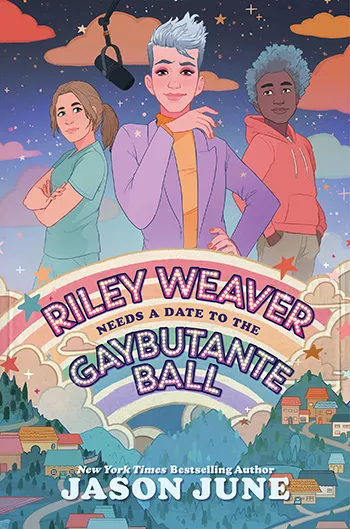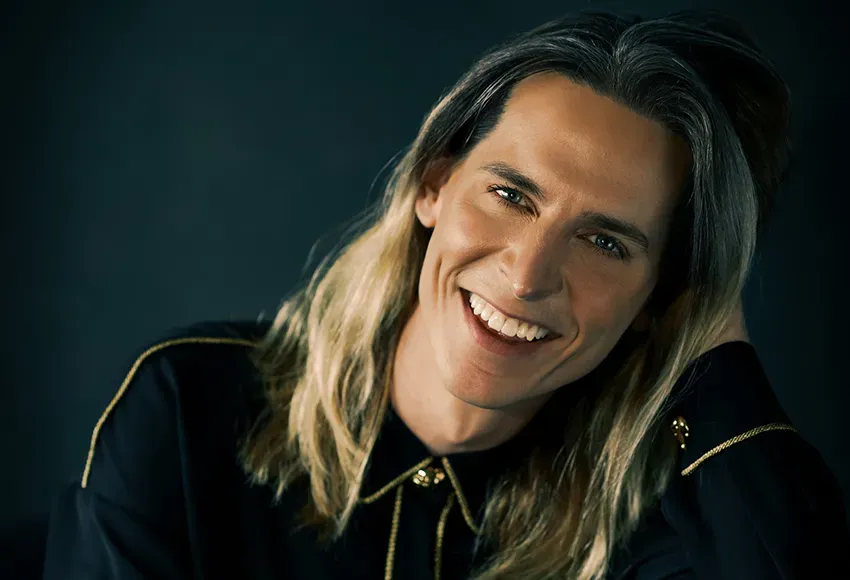What if we lived in a society where the concept of gender never existed? This was one of the questions on author Jason June's mind when he created his novel Out of the Blue. Of course, the fantasy/contemporary YA novel was inspired by a myriad of things, including his fascination with merpeople.
"My greatest inspiration is just that I freaking love merpeople," he gushed. "I have always been obsessed with mer-culture and mer-lore. The very first movie I saw in the theater was The Little Mermaid, and I have just been hooked ever since."
Exploring gender through multiple perspectives
One of the reasons Jason June (his "two-name first name, like Mary-Kate without the hyphen") loves mer-culture so much is the lack of human complications.

"One of my favorite aspects of Out of the Blue is exploring gender and the binary we have in human society, and letting mer be these people that don't see gender that way. They all have fins. They don't have the genitals that we've become so obsessed with in human culture," he explained.
As he built a world around mermaids, it only seemed natural to explore a society that existed aside from the gender binary. Jason June decided to use dual perspective in his novel, switching back and forth between Crest, a merperson, and Sean, a human. By alternating perspectives, he developed a rich dichotomy between a character raised in the gender binary and one who had never experienced it.
"One ...point of view is [that of] Crest, who goes by Ross on land," he explained. "They are mer. We're in their head, where we get to figure out how they think. We get to see, in real time, them reacting to things that are so gendered that don't need to be gendered."
Jason June explored and expressed some of his feelings toward the gender binary through Crest. "They don't understand why high heels, which have nothing to do with genitals, are so gender-ruled. It's like, 'Heels are for people with vaginas and not people with penises,' and they're like, 'Wait a minute, this makes zero sense?' And it makes zero sense! There's nothing about the inherent build of that shoe that should go with either set of genitals. It's so bizarre that we code it that way."
Through the perspective of Sean, Jason June was also able to show how cis people can alter their ways of thinking to be more inclusive of those outside of the gender binary. "When Sean first meets Crest, he refers to Crest with he/him pronouns, not knowing that they go by they/them pronouns," he said. "They just show once you have this conversation – which doesn't have to be this huge moment – once somebody says, 'Hey, these are my pronouns,' they switch. It was this subtle signal to folks, especially cis folks, that it doesn't have to be a huge, big deal. It's just about respect."
Everybody makes mistakes
Sean's character is treated with grace and forgiveness when he initially gets Crest's pronouns wrong, showing that even well-meaning people can get tripped up by the gender binary. "He automatically does what so many of us good-naturedly do. We're not trying to impose expectations on people about gender."
Even people like Jason June, who is Genderqueer, can make mistakes from time to time. In some of the first few copies of the novel, Crest is misgendered on more than one occasion. "It was this realization that we are all in this prison-house of language," he said, "and even though I read the book a dozen times before it went to print – multiple people read the book multiple times to catch things – there was still this handful of times where none of us caught that the pronoun was used incorrectly. We're so ingrained that it's just he/him or she/her that it can still slip by."
While it was embarrassing, he believes his mistake was a great example of how to handle misgendering someone. He fixed the problem and moved on.

Femmes just wanna have fun
Jason June had a lot of fun writing Out of the Blue. The novel was very personal to him, as he felt more connected to Crest than any other character he'd created.
"They present themselves very feminine. They wear feminine clothes and experiment with makeup and high heels," he explained. "That's the closest thing I've gotten to my own life, being a Genderqueer person, being a femme person."
Jason June expresses his identity by embracing femininity and scrambling the gender binary. "I like working out where humans have gone wrong in their binary thinking. That's not to say that when people identify with either end of the binary that's not also a beautiful thing, too, because it is. Everyone's gender, even if it's traditional cisgender identification, is a great thing and a wonderful aspect of ourselves to embrace, love, and show the world. I wanted to show in this how beautiful it can be when someone doesn't want to be on either end of [the spectrum] and knows they're not on that binary. Gender should be a beautiful expression for all of us."
In love with La La Land
Not only was Jason June able to write about some aspects of femininity he loves to embrace, but he shared his love for a special place. "[The book is] set in Los Angeles, and I fell in love with Los Angeles," he said.
He originally grew up just outside Spokane, a conservative city in Eastern Washington. After leaving, he settled in Seattle for school. Eventually, he found his way to the City of Angels.
"I find that Queer people, like myself, who are from a small town, find an area that is very warm and welcoming and wants us to be there. Sometimes that's hard to find in a small rural environment," he explained. "When we get to this area, often a big city, we feel like we're a part of the community. We literally fall in love with the place, and the place becomes a part of our being. I wanted to explore what happens when you fall in love with a place, but you're also in love with a person. You have to choose one another."
For Jason June, the place he loves is LA. For Crest, it was the ocean. Putting their real feelings for the place they call home into the novel added depth to Crest's love of The Blue and a great conflict for a budding romance. While many love stories play on the "person vs. place" love triangle, Jason June examines the message at the core of the conflict.
"Sometimes the best choice, especially in a young adult novel, is for us to lead our own lives and not build our sense of self on another person," he said.
Learning to love ourselves
Jason June has been with his husband for 12 years. He believes romance is important in life and can lead to tremendous self-growth. However, he hopes readers take away the message that self-love is just as, if not more, important, especially for young people. "Both options are very valid, and both options can make you happily-ever-afters," he said.
While his novels are fun and creative from start to finish, he follows a rigid schedule to keep himself on track. "I am a very type-A Virgo, so my creative process can sometimes seem business-y and analytical. I won't start a novel until I have a whole outline first," he said with a laugh.
And Jason June's outlines can be pretty extensive. For Out of the Blue, he accumulated 30 pages of notes before ever drafting. "It gives me a roadmap to figure out what this story is going, so that I can figure out the kinks before I get to them and potentially experience writer's block."
It usually takes him about a month to complete an outline. From there, he begins his drafting stage. "I set myself word-counting goals, as unromantic as that sounds. I'll do 1,500 to 2,000 words a day. I can get a first draft written in about six to eight weeks. Then I send it off to my editor."
His preplanning allows Jason June to put all his mental energy into creativity once he's got the bones of the story down.
"It sounds obsessive, and it kind of is," he joked.

Up next: Gay chaos
Jason June is in the final stages of wrapping his latest novel, Riley Weaver Needs a Date to the Gay Gaybutante Ball. "It's my favorite thing that I've ever written. It follows a femme Gay teen named Riley, who has these big podcasting dreams," he explained. The story is set in a fictional small town called Mountain Pass, located in the Cascades, just outside Seattle. Riley dreams of making it big and hopes to join a Gay debutant organization to help network.
"It's a fictional society, but it would be so magical if this were real," he added.
Riley must complete the four pillars of gayness: "hosting a party, mentorship, service, and lastly, general Gay chaos, which as we all know in the Queer community, we tend to create," Jason June explained. His final task is finding a date to the ball, a prospect hindered by a fellow Queer classmate who exclaims that "real" Gay men aren't attracted to femmes.
"He's got that sort of 'dudes are into dudes' mentality, and so if you have a male body and present yourself femininely, you're something other than Gay," Jason June said.
To prove his classmate wrong, Riley bets his future as a gaybutant and sets out to find a masculine date to the ball. The novel is full of humor, Washington vibes, and Gay chaos.
"Through it all, we discover that labels for our gender and sexuality can be liberating, but they can also be very limiting," Jason June said. "Sometimes, just because labels aren't 100% accurate for us doesn't mean we don't get to have them or claim them. What label is 100% accurate for any person?"
Riley Weaver Needs a Date to the Gaybutante Ball will be available starting on May 23. Out of the Blue is out now. Grab a copy and read along with us at the SGN Book Club!


